menu
 NEWS
NEWS
Metal Recycling Monthly
No.627
Wednesday, October 1, 2025 (8)
(Approved as a Third-Class Mail Item on August 20, 1968)

Fuji Car Manufacturing (Headquarters: Moriyama City, Shiga Prefecture; President: Meguru Torii), which operates environmental equipment and plant-related businesses within the TRE Holdings Group, celebrates the 100th anniversary of its founding this year. Since changing to its current company name in 1945, the company has expanded its business operations, and in 1969, it began developing and manufacturing processing machines for metal recycling. At the time of this expansion, Japan was in the midst of its high economic growth period, an era when improvements in processing speed and expanded processing capacity were demanded. The company's processing and treatment equipment, serving the needs of markets developed by major manufacturers, rapidly became widely adopted due to its high reliability, and the company became a key player in modernizing the industry's equipment. The company has supported the growth of the metal recycling industry for more than half a century, and even in today's changing times, it continues to maximize CX (customer experience) and develop advanced recycling equipment. Let us look back on Fuji Car's 100-year trajectory.
Fuji Car Manufacturing (below, “Fuji Car”) was founded in 1925 as a forging machinery manufacturer. In 1945, it advanced into railway vehicle manufacturing for both state-owned and private railways, at which point it changed to its company name to the current one. Subsequently, the company actively expanded into bridges, steel beams, steel towers, high-pressure vessels, and chemical machinery. In 1963, the company acquired 200,000m2 of land in Moriyama Town (now Moriyama City) in Shiga Prefecture, and its current headquarters stand on this land. The company relocated its vehicle and bridge production division from its Osaka Plant (90,000m2) to this new site. The following year, 1964, it forged a technology partnership with West German company KUKA, and developed products such as a KUKA-style rotary loader (public hygiene vehicle) and sludge suction vehicle. It also began production at the Shiga Plant. In 1965, at the request of its main bank, the company increased its capital with a stake from Ube Industries (now UBE Corporation), and it became an Ube group company.
At the time, Ube’s vehicle division had a market share of almost 40%. This earned it a high level of trust, and Fuji Car’s vehicles accounted for most of the various types of equipment used for on-site transportation of molten steel and slag by major steelmakers such as Yawata Iron & Steel and Fuji Iron & Steel (which merged in 1970 to form Nippon Steel Corporation). Furthermore, the bridge division, which accounted for around 20% of sales, built a large proportion of the expressway bridges that were constructed as Japan redeveloped its land. The company also made a name for itself outside Japan in Southeast Asia, building the Krungthep Bridge in Bangkok, Thailand, as well as what was then the longest bridge in Indonesia, the Bung Karno Bridge (now the Ampera Bridge), which remains a landmark in the city of Palembang on the island of Sumatra. It also constructed a bridge across the Tonle Sap River in Cambodia.
The machinery division, meanwhile, which accounted for close to 30% of sales, was active in the shipbuilding industry, in which Japan was the world’s largest player. The company’s ship frame benders (machines for bending steel sheets) were delivered to shipyards, and a process for bending 50mm x 15m thick sheets for the construction of large ships was also developed. And shipbuilding aside, the company's large-scale equipment, including 200mm x 4m steel sheet straightening machines and 1,000-ton hydraulic presses were adopted by major steel manufacturers.
The company’s divisions for high-pressure containers and chemical machinery produced large-scale equipment for oil refining and the chemicals industry, and also made tanker trucks, which operate on public roads. It also boasted a domestic market share of 60% in tanker ship tanks. All in all, it is no exaggeration to say that all of the company’s wide-ranging business operations supported Japan's post-war economic recovery and reconstruction.
Fuji Car had thus cemented a position as a major company, and its processing machine division’s long-awaited entry into the business of metal recycling was an epoch-making one for the industry, and created a lot of waves. The metal-recycling companies of the time welcomed Fuji Car’s arrival, and in 1970 this newspaper featured several articles about it, attesting to what a revolutionary event this was for the sector in that era.
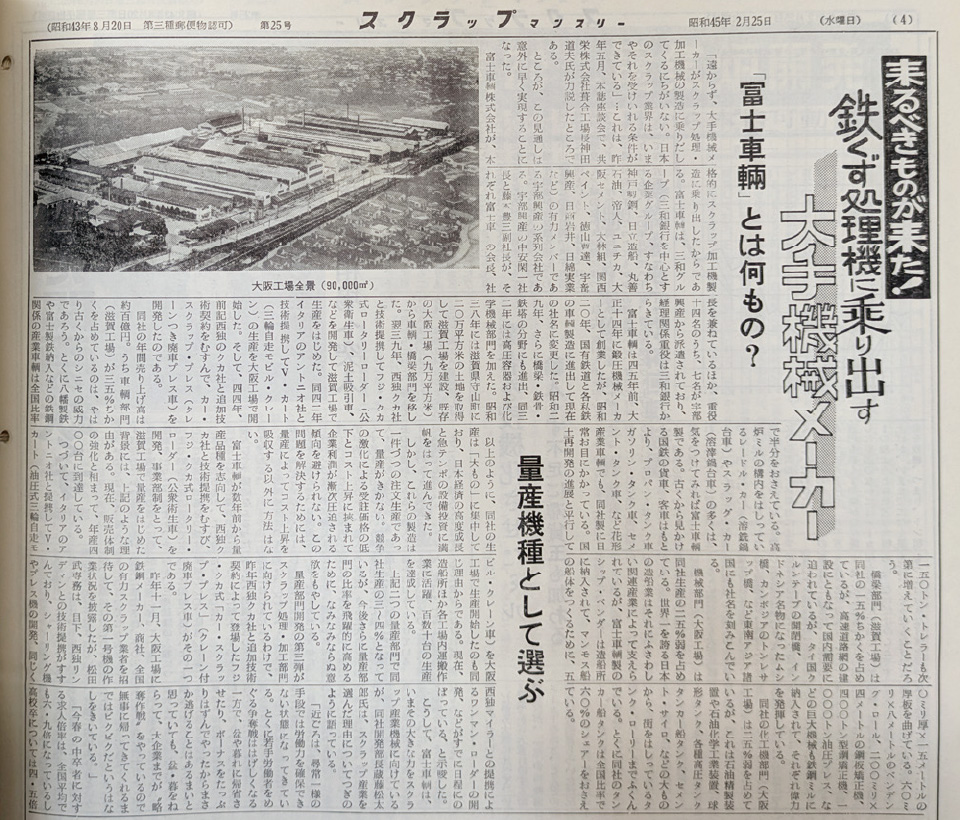
The impetus for Fuji Car’s entry into the metal scrap recycling business in 1969 stemmed from several factors, and reflected not just the circumstances in the industry but also the changes in the environment surrounding the domestic economy. Between 1955 and 1973, Japan’s real economic growth averaged around 10% per year, so it was a period of rapid economic growth. At the same time, heavy industries such as steel exhibited stunning growth, causing the amount of scrap iron being generated domestically to increase at a fast pace. This meant that metal recycling companies had to process huge quantities of scrap, but this economic prosperity also brought with it negative effects such as labor shortages.
Back then, there were numerous small and medium-sized firms specializing in metal recycling, and processing machines were widespread. However, they were inefficient and unsuited to processing on a large scale, so they were failing to meet the needs of industry in some respects. As a result, and in order to modernize the equipment in use, demand for new processing machines of the like used in the West soared.
Fuji Car, meanwhile, had achieved success in all its businesses, but they were all specialized in large-scale equipment, and every design was different. Every order received was worth a lot of money, but the situation made mass production impossible, and this became an issue. As the economy grew fast, competition intensified and costs increased, putting pressure on profits, and the only way to overcome these problems was to streamline operations and establish a mass production system that could absorb the costs. This led to the technological tie-up with KUKA of West Germany, which in turn resulted in the development of a Fuji-KUKA-style rotary loader (public hygiene vehicle). This became the company’s first mass-production unit, with 400 units being turned out every year. Next, Fuji Car, which wanted to further enlarge its mass-production division, turned its attention to processing machinery specialized for scrap metal. The biggest negative consequence of the high economic growth period was a shortage of labor. As Fuji Car investigated the metal recycling industry, it discovered that the biggest headache for managers of metal recycling companies at the time was the aging of staff, and realized that mechanization was more necessary than in any other industry. Fuji Car’s acceptance of responsibility as a company to popularize, in the metal recycling industry, processing machinery that, thanks to mass production, would be reliable and among the best in the world, helped the company make the decision to move into the sector. These changes in the times brought both sides together, and Fuji Car opened the door to the modernization of the metal recycling industry in Japan.
Fuji Car signed a contract with KUKA of West Germany for additional technology, and its first product for metal recycling was a Fuji-KUKA-style car scrap press (vehicle disposal press with crane). This first machine was purchased by a shredder company. It would travel around car scrapping centers and companies that dismantled discarded cars, pressing the vehicles on site. Fuji Car’s engineers had designed it to comply with standards under the Road Traffic Act, and the machine could press a car in three to three and a half minutes. It featured a crane that could rotate 360 degrees, and it took just four minutes until the car could be extracted from the press. The dimensions of the press mold were uniform, so according to Fuji Car’s calculations, 15 pressed cars could be loaded onto an eight-ton truck, but the actual figure turned out to be as many as 20, and in an article in this newspaper, it was stated that transportation costs were more than 30% lower than expected. Since pressing operations and transportation could be performed by a single person, this mobile and highly efficient press vehicle, combined with strengthened collection power, proved enormously effective in the metal recycling industry.
Following this "car scrap press," Fuji Car developed one-man loaders and bullet presses, which also saw rapid adoption, further attesting to the company's high level of technology. The company next focused on hydraulic shears and press machines, which remain in widespread use in the metal recycling industry today. The first production press machine completed by Fuji Car was installed in December 1970 by Nishikawa shokou Inc. (Sakai City, Osaka Prefecture; at the time called Nishikawa Shoten), and the first hydraulic shear machine was installed the following February at the Tadaoka plant of Nakatsuji Limited (Izumisaki District, Osaka Prefecture). These epoch-making press machines and hydraulic shears from a major manufacturer, which were designed to be as powerful as possible and had never before been owned by small and medium enterprises, elicited an unexpectedly strong response and orders immediately expanded.
The innovation was not only in processing machinery technology. Although small machinery manufacturers had their merits, they lacked integrated design, engineering staff, and factory facilities, so they would bring all the parts to the metal recycling company, perform assembly there, and conduct trial operations for the first time while making adjustments. While installation would sometimes be completed as scheduled, in some cases even machinery manufacturers were unable to handle the work themselves and had to bring in specialized technicians from outside to complete the machines. During this time, no processing whatsoever could be performed until the machinery became operational, so the introduction of machinery was accompanied by the risk of considerable lost time. In contrast, Fuji Car, which possessed an integrated system from design through assembly, would manufacture machines at its own factory, conduct test operations in the factory itself, and then make adjustments according to the specifications before finally proceeding with installation. Furthermore, everything from pumps and their piping to electrical equipment and wiring was completed in parallel with the main body of the machine, and in the case of presses, the system could enter full operation approximately one month after the foundation work, which earned the company high marks for the minimal time loss involved.
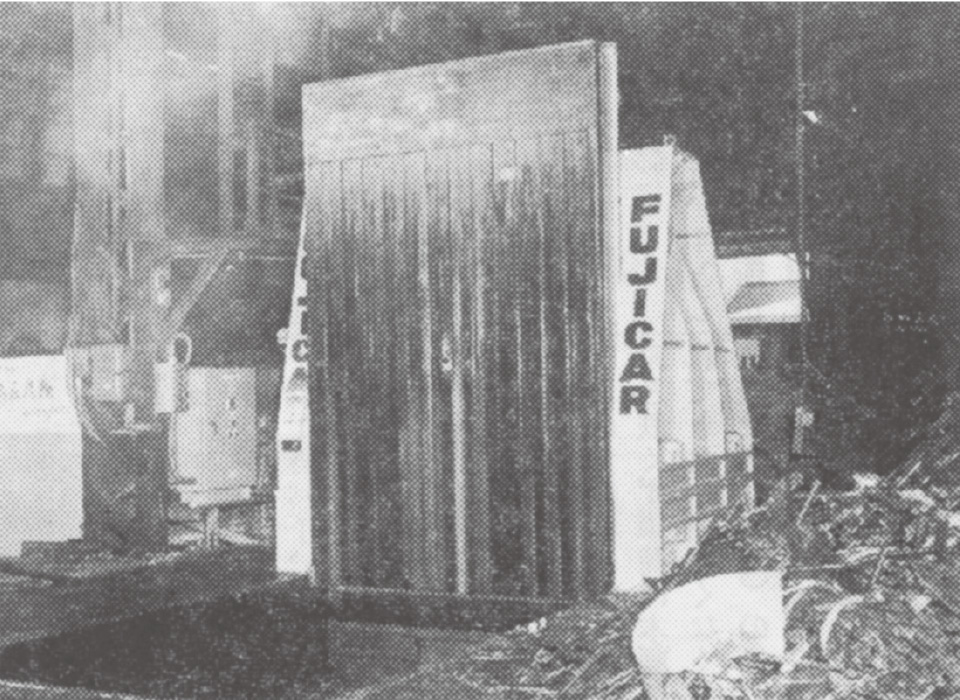
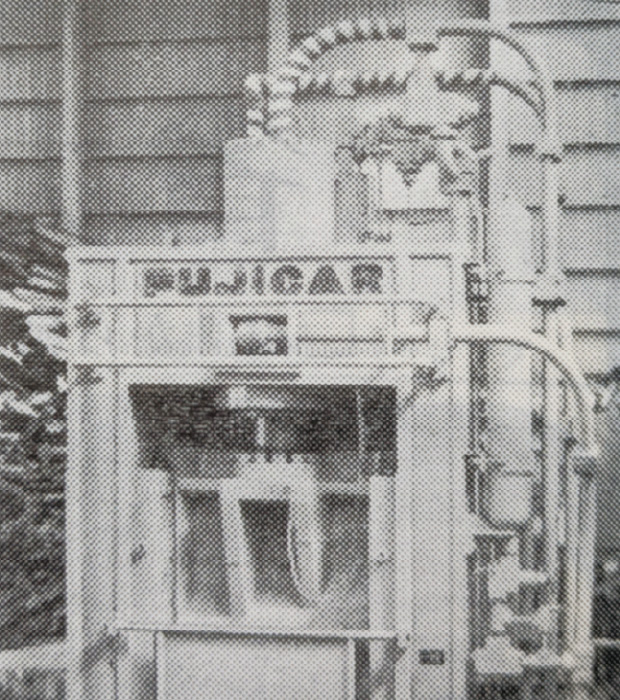
As a new challenge, the company next expanded its business domain into shredders. Through a technical partnership with U.S.-based Newell Recycling Equipment, which had received more orders for shredders than any other company in the world, a 1500-horsepower shredder plant, the first domestically manufactured unit, was purchased in 1981 by Makiura Steelwork (Himeji City, Hyogo Prefecture). In 1991, Topy Industries installed Japan's then-largest 4000-horsepower shredder plant manufactured by Fuji Car at its Toyohashi manufacturing plant, and the gap between Japan's recycling equipment and that produced in the West, which had been significant, quickly closed. Later, as Japan's bubble economy collapsed, the country suffered economic deterioration, and Fuji Car, with various factors compounding, went into bankruptcy under the Civil Rehabilitation Act in 2001 due to financial difficulties. This became a turning point, and while revamping the company’s old business model, in 2008, the president, executives, and employees each took ownership of one-third of the shares, and management and employees began working together as one in business operations. In the fiscal year ended March 2009, the company posted operating profit of 380 million yen, marking a “second founding.”
The 1997 Kyoto Protocol made reductions in greenhouse gas emissions mandatory, and simultaneously, integrated steelmakers worked to expand the use of scrap iron, which allows greater suppression of CO₂ emissions compared to primary raw materials, providing a tailwind for business growth. The company delivered one large shredder plant each to Nippon Steel’s Oita manufacturing plant in 2008 and JFE Steel’s East Japan Works the following year. And in 2011, Hyundai Steel of South Korea purchased a mount shear. This makes it clear that the unshakable trust in its machines that Fuji Car had built up had now extended beyond Japan, as its machines were also earning high marks overseas.
Besides metal recycling equipment, the company also developed manufacturing equipment for RPF (solid fuel made primarily from waste plastic and old paper), which represented the crystallization of its engineering and development clout. The company actively expanded in two business domains: "Environmental Equipment and Environmental Plants" and "Vehicles," which handled bulk lorries and similar equipment. However, for future overseas expansion and further strengthening of domestic operations, the integration of "plant equipment development and manufacturing" and "recycling consulting" would be essential, and the company faced a significant management challenge in this regard.
Meanwhile, Takeei, a major comprehensive environmental company that had long engaged in business centered in the Tokyo metropolitan area involving collection and transportation of construction waste and other materials, intermediate processing, resource recovery, and final disposal, recognized the recycling market as a growth field and sought to create new businesses and develop a growth strategy that would include overseas expansion. For Takeei, constructing a business model that incorporated technological capability was vital. Takeei and Fuji Car’s interests aligned in fusing Takeei's soft expertise (know-how) with Fuji Car's hard assets (waste disposal plants) and seeking to create new businesses, and in 2014, Fuji Car made a new start as a group company of Takeei.
In 2021, TRE Holdings was established as a joint holding company of Takeei and River Holdings (currently River), an entity whose main business was metal recycling, and through the integration of these two companies, the business domain in the “venous” phase of the recycling industry was further expanded. Within TRE Holdings, Fuji Car, which develops special vehicles and various types of recycling plant equipment for mixed waste and scrap metal, possesses heterogeneous functions and is a significant presence.
Recently, for the metal recycling industry, the company developed the fine shredder "SHELLANOS" which separates and crushes miscellaneous scrap with high precision. In April of this year, as a 100th anniversary commemorative project, the company also concluded a joint research agreement with Saitama University on "technology to suppress welding defects in pressure vessels" and "technology to detect and predict abnormal sounds in environmental recycling equipment through sound analysis." For more than half a century supporting the metal recycling industry and serving as a driving force behind the modernization of recycling in Japan, the company has continued to pursue the development of new technologies without pause. It has undergone various transformations to adapt to the environmental demands of each era since its founding, and for the company, its 100th anniversary is merely a waypoint. And as a member of its corporate group, it will work toward the realization of TRE Holdings' stated goal of building an advanced recycling-based society and carbon-neutral society.
Over these past 100 years, Fuji Car has a history of determinedly overcoming countless trials thanks to its strong technical capabilities. As a former banker with strong analytical skills for evaluating companies, President Meguru Torii has resolved various issues, without putting them off, since he became president in 2018. He has also further refined the company's technical capabilities, which have long been highly regarded. He has thoroughly revamped the company’s internal organizational structure, and through the effects of his numerous reforms, has dramatically increased both sales and profits. While always valuing the culture of the company and the employees who work there, he has demonstrated leadership as a manager and built a stable operational foundation. We asked President Torii to share his thoughts on the company’s 100th anniversary.
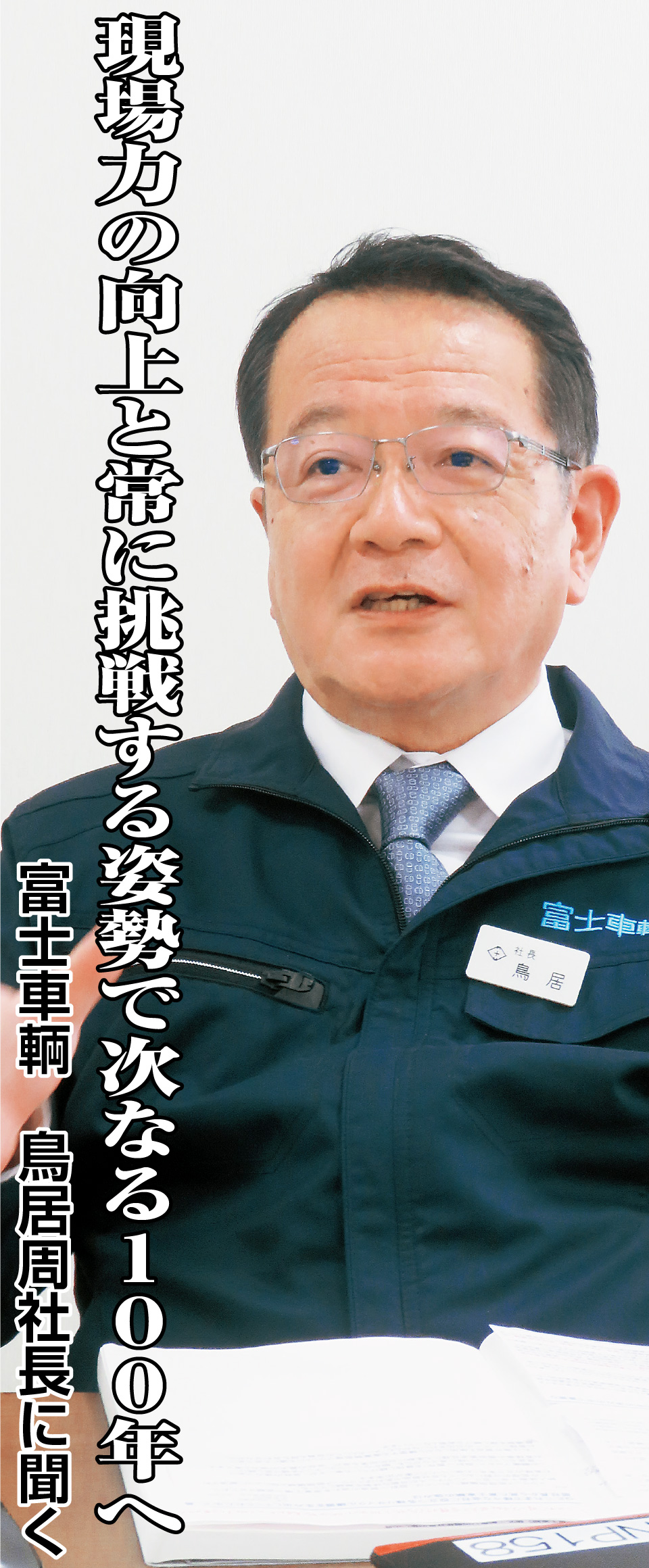
- What are your honest feelings at this moment?
Torii: The path to our 100th anniversary has not been smooth, and looking at our history in just the last quarter-century, we experienced the bitterness of failure when we filed for bankruptcy under the Civil Rehabilitation Act in 2001. Many employees faced uncertainty, but by not giving up and continuing to protect the frontline, we were able to build the stable foundation we have today. The experience of recovering from bankruptcy is something Fuji Car can be proud of, and I believe it will serve as the foundation supporting us over the next 100 years.
When I assumed the position of president in 2018, many issues remained, one of which was addressing the risk of accidents involving the mechanical parking garages we had sold until 2001, and we directly confronted it from both legal and technical perspectives. Since safety and corporate social responsibility are the soul of an enterprise, to serve as a memorial for accidents that had occurred, we also undertook the renovation of our company's memorial tower, which stands on Koyasan, a sacred mountain in Kansai's corporate culture. Keeping in mind that managers who refuse to run away engender new trust, we proceeded with our efforts.
The Fuji Car of today has a made a second start with frontline capabilities as the driving force, and since 2019, we have been pursuing a kaizen initiative that involves everyone, which is called “6S3T” (6S: Seiri (Sort), Seiton (Set in Order), Seibi (Service), Seiso (Shine), Seiketsu (Standardize), Shitsuke (Sustain) + 3T: Teihin (Constant Quality), Teiryo (Constant Quantity), Teichi (Constant Position)). Through this initiative, we have established a culture in which each and every employee makes proposals and takes action based on them. Improvements in safety measures, welding techniques, and quality are thanks to the steady efforts of all our employees, and have been featured in various media, which is evidence that the frontline capabilities we have developed over the years have been recognized by society.
The fact that we could reach this memorable milestone is thanks to the support of all our stakeholders, including shareholders, suppliers, sales partners, and business partners, and I would like to take this opportunity to sincerely express my gratitude for that support. To pass on our achievements to the next generation, we have made repeated efforts with a strong desire to be recognized by society as a company of value, while maintaining our connection with the history that our predecessors built over a long period of time. Now I am happily celebrating the company's 100th anniversary with all our employees, and going forward, each and every employee will play leading roles, boldly embracing challenges and making improvements of various kinds, refining our technology, and approaching the task of building new traditions with a sense of mission.
- Please tell us about the turning point that your 100th anniversary marks?
Torii: In 2014, we became a member of the Takeei Group, and in 2021, through the integration of Takeei and River Holdings, TRE Holdings was established, and became the industry's largest player. Within that structure, our company, as the group's only environmental engineering company, developed the capability to participate in large projects within the group, and being recognized for that is significant, I believe.
Also, in 2018, we launched a parking garage countermeasures project aimed at preventing serious accidents in mechanical parking systems and ensuring user safety. We conducted a complete survey of all equipment, and made repairs at 240 locations in 22 prefectures (including Tokyo, Osaka, and Kyoto), which took three years to complete. It took another four years to recover financially, and five years to resolve related litigation, but the project was eventually completed. For our company, this was symbolic of changes that put respect for human life at the core of our corporate philosophy. Moreover, even though we had withdrawn from the business of manufacturing and selling parking garage systems, we demonstrated a commitment to fulfilling our responsibilities to the end. This represented our sincere efforts in our pursuit of trust from customers and local communities, of which I am proud.
- What do you see as Fuji Car's strengths from your perspective as president?
Torii: In the scrap metal processing field and waste disposal field, we complete the entire process from design to manufacturing at our Shiga Plant.
After delivery, we maintain a system capable of performing maintenance for decades, which allows customers to use the products for a long time. Our company places importance on the continuation of this seamless process from design to manufacturing, and while changes may seem invisible, we make repeated, detailed version updates and can flexibly respond to the specific usage requirements of each customer. In recycling plants, by combining our own products with excellent overseas-manufactured equipment, we have established a system capable of proposing optimal solutions for our customers, which is a major strength.
- What direction and strategy do you envision as a plant manufacturer?
Torii: The direction of environmental recycling domestically originates from the pursuit of carbon neutrality and a recycling-based economy, and with changes in energy and the creation of a sustainable society, resource cycling will see further advances. Regarding scrap-metal-related operations, the decarbonization of blast furnaces is progressing, and if the number of electric furnaces increases in the future, fierce competition to obtain scrap iron is expected to occur domestically. We have worked side by side with scrap metal dealers for more than half a century, so this should mark a significant turning point for us. No matter what era comes, our company will continue to pursue peace of mind and safety, and our commitment to maximizing CX by combining products and services will not change.
Furthermore, our company's positioning within TRE Holdings is as the group's only engineering company, and since the group is continuing to make large investments in waste disposal facilities, our company participates in the EPC (engineering, procurement, construction) division at such facilities, greatly contributing to group synergies.
To always be able to contribute to group development, the deepening of technology and the pursuit of new technologies through industry-academia collaboration will naturally be necessary, and sometimes, we would like to strengthen our role as a bridge builder that can strengthen coordination within the group by doing business with companies outside the group. I also want us to execute one initiative after another to generate new synergies.
- Please tell us about new development themes and initiatives as you look toward the next 100 years?
Torii: Our company actively incorporates new technologies such as remote monitoring and AI applications while conducting development aimed at labor-saving and efficiency improvements for scrap metal processing equipment and recycling plants. We are also pursuing development that goes beyond ensuring equipment durability, which we take as a given, to facilitate maintenance through further evolution based on our past achievements. Beyond that, through an approach combining software and hardware, we are boldly taking on the challenge of providing new value that did not exist before.
Above all, I view our most important task as the cultivation of human resources to support such development. We are not only working to pass on the technological expertise and strong skills that have supported our production activities for 100 years, so that they remain for our next 100 years, but also concentrating on the construction of business systems that can continuously transform and evolve. To develop the next generation of human resources, we are running a pilot project for remote inspection and maintenance of recycling plants using a DX-driven skill transfer system, and in 2024, this project was selected to receive subsidies from Shiga Prefecture, having been recognized as having the potential to equip society with technology for the near future. We are also working to nurture young skilled technicians through this unique system.
In addition, this fiscal year, as part of activities to celebrate our 100th anniversary, we have concluded a joint research agreement with Saitama University's Graduate School of Science and Engineering on two themes: "technology to suppress welding defects in pressure vessels" and "technology to detect and predict abnormal sounds in environmental recycling equipment through sound analysis." Currently, 10 employees ranging in age from the 20s through the 50s are conducting technological development with Saitama University, and we are advancing industry-academia collaboration discussions in different fields as well.
- Finally, could you share a message for employees and business partners?
Torii: Looking toward the next 100 years, what our company should aim for is evolution as a manufacturer trusted by society. We are taking on the challenge of developing a supply chain for ammonia, which is attracting a lot of attention as a non-carbon fuel for power generation, and tackling new themes such as DX for skill transmission and anomaly detection using AI. Our company is one that has survived by repeatedly overcoming trials during turbulent times spanning the Taisho, Showa, Heisei, and Reiwa eras, and no matter how the times may change going forward, the strengths we possess, namely frontline knowledge, ability to improve, and the commitment to upholding safety and quality, will not change.
To the business partners who have supported and cooperated with us over many years, I once again express my appreciation, and I ask for your support as good business partners going forward. What should be increasingly valued in times to come is not leaving change to others, but first taking action oneself, and building trust through deeds rather than words. This is the spirit of "leading by example." From us in management to those on the frontlines of our operations in the field, we will take the next step forward with this conviction, and also with responsibility and pride. At the same time, while offering heartfelt respect and gratitude to those who have supported us and to the colleagues who have labored alongside us, and aiming to become a company where all employees can say they take pride in working at Fuji Car, I want to continue moving forward.
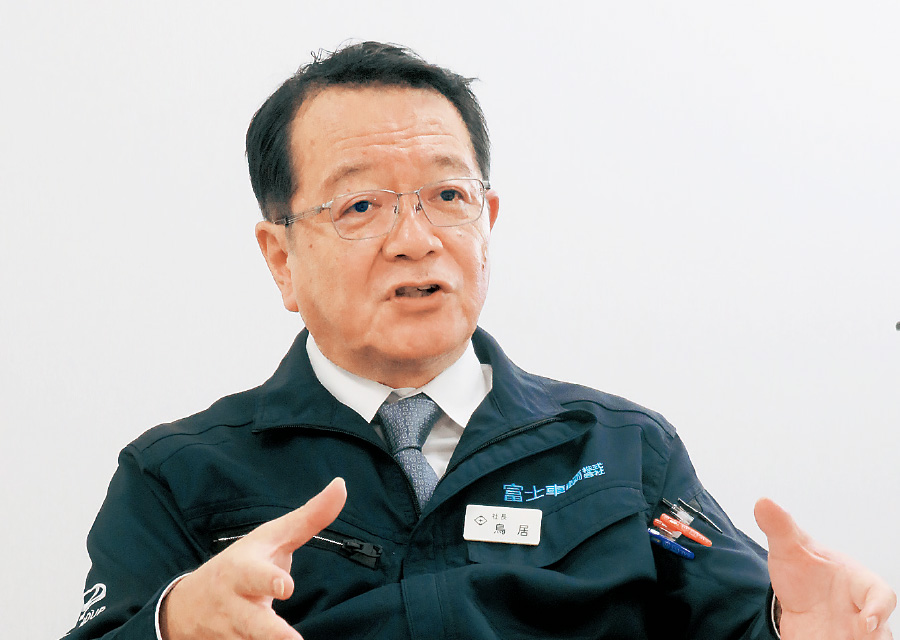
Born in 1961.
After serving in key positions including branch manager and executive roles in the sales division at a city bank, he served as general manager of corporate strategy headquarters and general manager of the PR/IR office at a construction company, and as general manager of administration and general manager of the TQM promotion office at an alloy manufacturer. He joined Fuji Car in 2017 and assumed the position of President in June 2018.
Leveraging experience cultivated in different industries, he pursues an approach to management that fuses an emphasis on the frontline emphasis with strategic perspectives.
Foundation: October 1925
Establishment: February 1944
Capital: 250 million yen
Representative: Meguru Torii, President
Stockholder: Takeei Corporation
Headquarters (factory): 13-1 Chishiro-cho, Moriyama City, Shiga 524-0034
TEL +81-77-583-1235 / FAX +81-77-582-8805
Tokyo branch: A-10F Shiba Park Build., 2-4-1 Shibakouen, Minato-ku, Tokyo 105-0011
TEL +81-3-6402-4184 / FAX +81-3-6402-4185
Osaka branch: 8F Nakao Royal Build., 2-14-10 Miyahara, Yodogawa-ku, Osaka City, Osaka 532-0003
TEL +81-6-6394-4100 / FAX +81-6-6394-4102
Tokyo office: 7-21-14 Togane-cho, Katsushika-ku, Tokyo 125-0041
TEL +81-3-3607-3196 / FAX +81-3-3627-6624
Nagoya office: 89 Horogo, Narumi-cho, Midori-ku, Nagoya City, Aichi 458-0801
TEL +81-52-621-9119 / FAX +81-52-622-8901
Fukuoka office: 3-7-30 Matsuda, Higashi-ku, Fukuoka City, Fukuoka 812-0064
TEL +81-92-622-1758 / FAX +81-92-622-1415